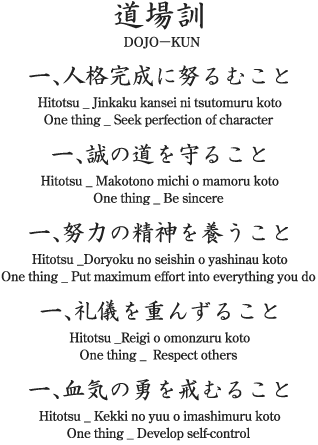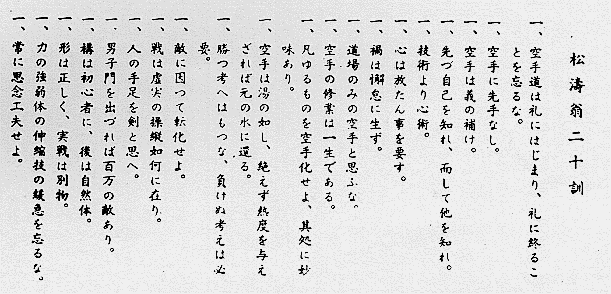
Write something
Warriors of Budo: JKA (Mori, Naka), KWF (Yahara), Wado Ryu (Ohtsuka)
This is the Trailer of an absolutely must see video by Empty Mind Films. It is called Warriors of Budo and in this episode they feature among others two of the greatest Shotokan organizations, the well-known JKA and the KWF of the famous Yahara Shihan. They also present Kyokushinkai Karate and the Wado Ryu with Ohtsuka Shihan. If you really like Shotokan and Budō, you should definitely consider buying this video! (I of course did!!!) OSS Nicolas
1
0

The Dōjo Kun - The 5 Shotokan Karate-do guiding principles
I've always been amazed by the beauty of these guiding principles of Karate-do practice. In fact, it's so wonderful that through practice, the ancient masters brought out such a beautiful philosophy. A very important thing to notice is that none of these precepts is about the physical aspect of the practice. Because... Karate is not a sport, it's a way. A way of living, a way of being. And that's why the founding fathers always placed courtesy, spiritual values and self-perfection as the cornerstone of Karate. As master Funakoshi Gishin wrote: "Spirit first". Traditionaly in Shotokan, the Dōjo Kun is repeated out loud at the end of each class. And each of these precepts is a guiding and living principle that all Karate-ka strives to cultivate and respect through training both inside and outside the Dōjo. Although the Dōjo Kun is not commonly known and used nowadays, there is a globally accepted translation in all traditional Shotokan Karate organization like JKA, JKA, JSKA, SKI and NSKF. It can be noted that some traditional Karate organizations such as Yahara Shihan's KWF abandoned the Dōjo Kun years ago (Have they come back from this position?). You can see this common translation in the attached picture. But for my part, I prefer to use the following translation that I thought about ten years ago. I think this fits better with the original Kanji (Chinese characters) and the meaning that Master Funakoshi wanted to cultivate and share through Karate. And what’s more, it makes more sense to me and resonates more deeply in my heart. 一、人格 完成に 努める こと hitotsu, jinkaku kansei ni tsutomeru koto Seek the accomplishment of character 一、誠の道を守ること hitotsu, makoto no michi wo mamoru koto Defend the path of sincerity 一、努力の精神を養うこと hitotsu, doryoku no seishin wo yashinau koto Cultivate the spirit of perseverance 一、礼儀を重んずること hitotsu, reigi wo omonzuru koto Honor the principles of etiquette 一、血気の勇を戒むること hitotsu, kekki no yū wo imashimuru koto Control your impetuosity
5
3
New comment Feb 6

Old JKA self-defense movie / A few words about self-defense
For your pleasure here is a rare historical film presenting self-defense techniques according to JKA Karate in the 60s. The film was directed by the legendary JKA chief instructor, the late Nakayama Shihan. Since the beginning, Shotokan Karate has been primarily about self-defense. The spread of Karate across the world and the influence of Western culture slowly transformed it to ultimately make Karate a sport like all the others. And today, Karate is mainly practiced as a sport, with a logic of victory and defeat, and training has gradually evolved to adapt to sporting rules and be more effective for a competition perspective. Thus Karate becomes poorer and poorer, losing everything that is not useful to the competition, from technique to mind. It's logical, and even in Japan the most practiced Karate is the sports version of the World Karate Federation. I remember my early days in Karate when my Sensei always told me "It's up to the competition to adapt to the Dojo, not the Dojo to adapt to the competition." I truly believed this words, and I still do. Because I think that Karate is much more than a sport. Of course there can be a sporting aspect to the practice, and in fact it can be a lot of fun! But it's just a marginal side compared to what Karate truly is. Shotokan Karate is a beautiful art, a way of being that is deeply linked in its core to the spirit of Zen. And it is first and foremost an art of preservation. Preservation of physical and mental integrity, preservation of health, peace and harmony. Not only being able to respond to attacks in the street (and to be honest, this is not the main problem that people face in today's modern life), but also to learn how to be a better person, how to be in better shape and health, how to protect our loved ones and be a better example to them, how to grow as a human being, how to deal with life's challenges and chaos, how to get up after being knocked down by life, how to find balance in everyday life, how to support others on their own path, and how to create the life we deserve.
5
2
New comment Feb 5

Gichin Funakoshi Sensei's Nijū Kun
To follow up on the Guidelines post, here is an introduction to Gichin Funakoshi Sensei's Nijū Kun, the twenty Guiding Principles of Karate. Of course a must-have book for all Shotokan Karate practitioners! Naturally, the following translation is not perfect and is not done word for word. But I have tried to stick as closely as possible to the original statements, sometimes adding a little context to make them more understandable. You will also find in parentheses a very short note to clarify each precept a little more. So here is a summary of these 20 magnificent precepts that we strive to live and respect through our Karate-do practice: 一、空手道は礼に始まり礼に終る事を忘るな Hitotsu, karate-dō wa rei ni hajimari rei ni owaru koto o wasuruna Do not forget that Karate-do begins and ends with Rei. ("Rei" is sometimes translated as "bow" or "a bow", but it rather refers to the respect for etiquette and courtesy specific to Japanese Budō) 一、空手に先手なし Hitotsu, karate ni sente nashi There is no first attack in karate. (Karate-ka should not attack first, Karate must only be used to protect lives and as a reaction to adversity) 一、空手は義の補け Hitotsu, karate wa, gi no tasuke Karate stands on the side of justice. (Justice can also refer to righteousness) 一、先づ自己を知れ而して他を知れ Hitotsu, mazu jiko o shire, shikashite ta o shire First know yourself and then know others. (Do not care about what others do and think, instead try to master yourself and your own path) 一、技術より心術 Hitotsu, gijutsu yori shinjutsu Mind takes precedence over technique. (Always put spirit first, in Dojo as in life progress is always a process from the inside out) 一、心は放たん事を要す Hitotsu, kokoro wa hanatan koto o yōsu The heart must be free. (The heart also refer to the spirit, and the notion of freedom can also mean letting go) 一、禍は懈怠に生ず Hitotsu, wazawai wa ketai ni shōzu Misfortune arises from carelessness. (Calamity springs from laziness and lack of vigilance) 一、道場のみの空手と思ふな Hitotsu, dōjō nomi no karate to omou na Karate goes beyond the dojo.
5
0

1-4 of 4

skool.com/traditional-shotokan-community-6195
The home of Traditional Shotokan Karate-do!
Here no blue and red gloves! 😉
Karate as Budō, as a way of life, personal growth and enlightenment.
powered by
